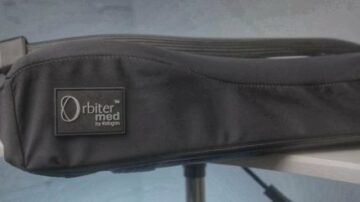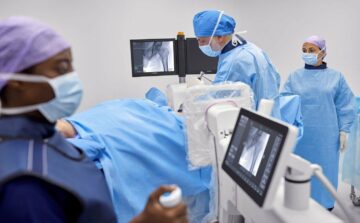<!–
–>

Huma will leverage Google Cloud’s generative artificial intelligence (AI) technology to streamline its disease-management digital product – a Software as Medical Device (SaMD) platform.
The digital health company said it plans to use Google Cloud’s generative AI (GenAI) to enhance the disease management platform, which centralises patient data so it can be assessed by clinicians or self-managed by patients themselves.
The platform, which provides enhanced decision-making tools for diagnostic recommendations and treatment, will now have GenAI to automate the generation of clinical summary reports from incoming data.
The New York-based company also says GenAI will improve communication between patients and providers, allowing more tailored care plans. Huma is also exploring optimising patient triaging by employing the use of Google Cloud’s Med-PaLM 2 – a large language model developed for the healthcare sector.
Along with medical imaging and digital diagnostics, digital health platform is one of the key drivers of AI uptake in healthcare. GlobalData predicts the global market for specialised AI applications will be worth $146 billion by 2030. However, its advantages such as freeing up clinician time, streamlining health pathways, and reducing overall costs, are placed in the context of an increasing reliance on automation. There are also concerns about how data is handled by generative AI tools, and how it might affect cybersecurity.
Google Cloud’s global director of Healthcare Strategy and Solutions Aashima Gupta said: “By incorporating AI into its disease management platform, Huma can empower its experts to focus on more complex tasks by automating repetitive ones. For example, gen AI can generate draft responses to member inquiries and requests, which Huma’s experts can then review and edit as needed.”
Huma’s chief medical officer Dr Mert Aral said: “We are tremendously excited about this partnership and the opportunity to explore how we can harness the power of Med-PaLM 2, assessing it across different use cases to drive better triaging and care optimisation for patients. At the same time, it is paramount that these AI tools are implemented in a responsible and safe manner.”
<!– GPT AdSlot 3 for Ad unit 'Verdict/Verdict_In_Article' ### Size: [[670,220]] —
!– End AdSlot 3 –>
- SEO Powered Content & PR Distribution. Get Amplified Today.
- PlatoData.Network Vertical Generative Ai. Empower Yourself. Access Here.
- PlatoAiStream. Web3 Intelligence. Knowledge Amplified. Access Here.
- PlatoESG. Automotive / EVs, Carbon, CleanTech, Energy, Environment, Solar, Waste Management. Access Here.
- PlatoHealth. Biotech and Clinical Trials Intelligence. Access Here.
- ChartPrime. Elevate your Trading Game with ChartPrime. Access Here.
- BlockOffsets. Modernizing Environmental Offset Ownership. Access Here.
- Source: https://www.medicaldevice-network.com/news/huma-taps-google-clouds-generative-ai-tools-for-digital-health-platform/
- :is
- $UP
- 2030
- 220
- a
- About
- across
- Ad
- advantages
- affect
- AI
- Allowing
- also
- an
- and
- applications
- ARE
- artificial
- artificial intelligence
- Artificial intelligence (AI)
- AS
- assessed
- Assessing
- At
- automate
- automating
- Automation
- BE
- Better
- between
- Billion
- by
- CAN
- care
- cases
- chief
- Clinical
- clinicians
- Communication
- company
- complex
- Concerns
- context
- Costs
- credit
- data
- Decision Making
- developed
- device
- different
- digital
- Digital Health
- Director
- Disease
- dr
- draft
- drive
- drivers
- empower
- end
- enhance
- enhanced
- example
- excited
- experts
- explore
- Exploring
- Focus
- For
- from
- Gen
- generate
- generation
- generative
- Generative AI
- Global
- global market
- GlobalData
- Gupta
- handled
- harness
- Have
- Health
- healthcare
- How
- However
- HTTPS
- Huma
- image
- Imaging
- implemented
- improve
- in
- Incoming
- incorporating
- increasing
- Inquiries
- Intelligence
- into
- IT
- ITS
- jpg
- Key
- language
- Leverage
- management
- manner
- Market
- medical
- medical device
- medical imaging
- member
- model
- more
- needed
- New
- New York-Based
- now
- of
- Officer
- on
- ONE
- ones
- Opportunity
- or
- overall
- Paramount
- Partnership
- patient
- patient data
- patients
- plans
- platform
- plato
- Plato Data Intelligence
- PlatoData
- power
- Product
- providers
- provides
- recommendations
- reducing
- reliance
- repetitive
- Reports
- requests
- responses
- responsible
- review
- safe
- safe manner
- Said
- same
- says
- Share
- Size
- So
- Software
- Solutions
- specialised
- Strategy
- streamline
- streamlining
- such
- SUMMARY
- tailored
- Taps
- tasks
- Technology
- that
- The
- themselves
- then
- There.
- These
- this
- time
- to
- tools
- treatment
- tremendously
- unit
- uptake
- use
- we
- which
- will
- with
- worth
- zephyrnet












